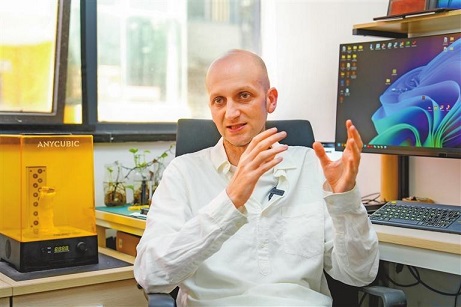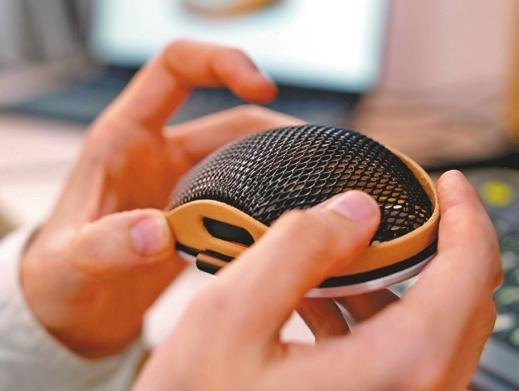Shenzhen
 2024/7/26
2024/7/26
 source: Shenzhen Daily
source: Shenzhen Daily
 Print
Print

Serbian designer Darko Nikolic, founder of Tride Design in Shenzhen, speaks during an interview with Shenzhen Daily. Photos by Lin Jianping

The D Mouse, one of Tride Design’s creations that won the prestigious Red Dot Design Award in 2024.
Liu Yangyang 524652046@qq.com HORROR, pain, and trauma are hallmarks of war. Yet even in the darkest of times, a silver lining can emerge. Serbian designer Darko Nikolic recently shared with Shenzhen Daily how two wars in his home country in the 1990s profoundly influenced his mind and creative skills, turning adversity into a transformative journey. “The first war started when I was only 5. Many of my toys were stolen, and my family couldn’t afford new ones because of the war-induced poverty. One day, my mom gave me a set of Lego bricks and encouraged me to use them to create any character or robot from science fiction movies and make even better ones,” Nikolic recalled. “By the end of the 1990s, another war broke out. At that time, my father repaired and sold discarded electronic devices for a living. I learned much about how different products and devices were made and worked. Meanwhile, we regularly customized various items, from simple wooden toys to household objects, in our garage,” said Nikolic. Nikolic’s early exposure ignited his passion for design. After the wars, he pursued formal education in industrial design. Driven by his passion for creating innovative products, he began working in Shenzhen in 2014 with tech firms in the drone industry. After gaining extensive professional experience and access to Shenzhen’s cutting-edge technology, investors, and manufacturing capabilities, he decided to found Tride Design in 2021. Sustainability and innovation According to Nikolic, Tride Design offers a diverse range of services, including product design, design consulting, 3D modeling, photo-realistic digital renderings, 3D printing design, and prototyping. Despite its broad portfolio, the company has remained steadfast in its core focus on sustainability and innovation. “For me, sustainable design is a way to explore a whole new world of products that can reduce negative impacts on the environment. I learned about this early in university, and it has led me to focus more on sustainable products. For our team, it represents a long-term business opportunity to scale our operations and help our clients become leaders in their respective industries and markets,” Nikolic explained. The D Mouse, one of Tride Design’s standout creations, won the prestigious Red Dot Design Award in 2024. This product exemplifies the studio’s commitment to sustainability, featuring an enclosure made from 98% recycled and biodegradable materials. It also has an innovative design that allows for easy disassembly, repair, and customization. Many components can be 3D printed and easily replaced if damaged. Additionally, the mouse has internal memory storage that allows files and media to be transferred between devices and a battery that can charge other devices. “The product was born out of my frustration with managing multiple devices every day. I envisioned a multifunctional computer mouse that could streamline the work of creative professionals. We applied lessons learned from helping our clients reduce their environmental footprints to this design, maximizing sustainability,” Nikolic explained. Going global Tride Design is dedicated to helping Chinese companies expand into foreign markets, he said. “Our mission is to assist more Chinese clients in designing products that can better compete in foreign markets. We see huge demand and opportunities for sustainably designed products in the West, and China, as a global leader in consumer tech, manufacturing, and recycling, can greatly benefit from this. Our vision is to design highly sustainable and innovative products for global markets.” “For example, we made our Chinese clients’ products more successful in foreign markets by substituting plastic parts with wooden components. This design change wasn’t costly but created premium-looking and feeling products that stood out in foreign markets and helped propel their business,” Nikolic said. With changing regulations and increased subsidies for sustainable startups in Europe, Nikolic sees great opportunities not just for smaller businesses and startups but also for Chinese manufacturers. “Europe’s evolving regulations and support for sustainable businesses create a favorable environment. We believe this will open up numerous opportunities for companies engaged in recycling and manufacturing in China,” said Nikolic. Why Shenzhen? Nikolic took a sabbatical in 2019 to travel the world, pursuing his passion for travel and nature. During his journey, he encountered diverse cultures and amazing people. He also became more aware of environmental challenges that further inspired his commitment to sustainable product design. However, he still chose to return to Shenzhen and establish his studio. “Shenzhen has provided me with an opportunity to better understand Asia and the future of technology,” said Nikolic. “I find the city very comfortable and different from Europe.” He emphasized that Shenzhen is a global manufacturing and tech hub that not only facilitates quick and reliable product design and development, but also attracts talented individuals with innovative ideas from all over the world. “As a young, developed, dynamic city, Shenzhen has an energy unmatched by any other place among the 40 countries I have visited,” he added.





